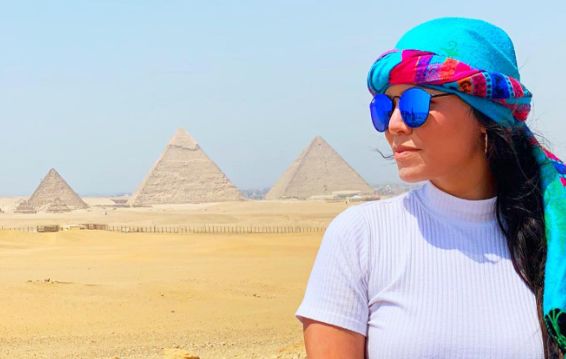São Paulo – Brazilian Lurdiana Tejas (pictured above), born in the city of Porto Velho, in the state of Rondônia, is 34 years old and, two years ago, became a celebrity in Egypt, an Arab country in North Africa. In October 2020, the belly dancer appeared in a video performing spontaneously, without makeup or costumes, at a Cairo beauty salon. The post went viral and reached almost 20 million views. Success continued to accompany the Brazilian in the Arab country; today, she has 2.5 million followers on Instagram and 331,500 on Tiktok.
The dancer reported she was surprised at first when she realized the video had gone viral and saw her Instagram reach over 800,000 followers in a matter of days. Then she was concerned about something so quick and unexpected. “All the news and TV shows in Egypt and other Arab countries were talking about me, and my life, which was private, suddenly became public,” recalls Lurdiana, recalling it was even discussed in Dubai, in the United Arab Emirates.
After the video was posted, the professional, who had been living in Egypt since 2017, became famous and began to be more in demand for concerts, weddings, engagements, and other events. Despite missing Brazil, she has no plans to return and believes she still has much to do in the Arab country. In addition to her success in Egypt, Lurdiana won over her compatriots and has already participated in shows on some of the most important Brazilian television and radio networks.
Dancer
Lurdiana was born and lived in Porto Velho for seven years, then moved with her family to southern Brazil. Before living in the land of the pyramids, she resided in Balneário Camboriú, in the state of Santa Catarina. She started taking classes in different styles in the city, such as ballet, jazz, hip-hop, and tap dancing.

The passion for dance came from the cradle. Her mother, Maria Zilza, was a ballet teacher at a studio and a preschool. In addition to her mother, her stepfather and uncles were also involved in dancing. Aged 13, still very enthusiastic and more experienced in the art of dance, she decided to help the family matriarch in her ballet classes.
Her mother also influenced her desire to learn a new dance style. Maria started taking belly dancing classes to instruct students in the future, but access to materials and courses was still a little scarce. To help with learning, Lurdiana started to accompany her mother in this new endeavor.
After the Brazilian telenovela ‘O Clone’ aired in 2001, the regular ballet students at Maria’s school wanted to learn belly dance. Lurdiana joined the ranks and remained in the classes until she was 20. “At that time, my top priority was not to learn belly dancing because there was ballet and jazz. At 15, I was already teaching ballet classes by myself. But around 20, my mom stopped teaching belly dance, so I took over her classes. As I only knew the basics and there were few teachers in my city, I went to other cities in Brazil, such as Porto Alegre and São Paulo, to improve myself and took courses with teachers who studied in Egypt,” said Lurdiana.
Before deciding she wanted to pursue a career as a dancer, she attended a semester of Physical Education and almost finished her undergraduate course in Pedagogy. Still, she gave up as the call to dance prevailed. The Brazilian remained a belly dancing, ballet, and jazz teacher until she was 27, when she received a proposal to move.
Life in Egypt
Before her video went viral and she became famous, a significant change happened in Lurdiana’s life when she received an invitation to work in an Egyptian dance company in 2017. “My friend worked at this company and referred me. She said I could work with belly dancing and a performing group with different dance styles,” she said. Her friend was in another country, which gave the Brazilian confidence to move on. Ten days after submitting her resume and being approved for the company, she changed house, country, and job.
The initial idea was to stay for just three months, the dancer even had a ticket back to Brazil, but when time passed, she decided to stay for a year. At the end of 12 months, the holidays came, which she spent in Brazil, and on her return, Lurdiana renewed her contract with the company, where she remained until 2020.
In her solo career for two years, the dancer performs at weddings, engagements, restaurants, Henna Party (bride’s party before the wedding), and beach events in the summer. Still, she says adapting to life in a different region was difficult. “It is another culture, different habits, another language, and predominant religion, so I had to put my judgments aside to enter this space. At first, it was just mimed to talk because I didn’t know English; I had to learn it from scratch.”
Currently learning Arabic, the dancer recalls she had to adapt her dance style to Egypt, as they present themselves differently from Brazil. “I don’t use Brazilian songs in my presentations, and, to adapt, I needed a lot of training and help in the beginning. I strive daily to dance more like the Egyptians, and I’m happy to be highlighted in this cultural dance, even though I’m Brazilian,” said Lurdiana. “It wasn’t just luck, I chose dance and dedicated myself entirely with all my heart, so I got this return.”
Fame and nostalgia of Brazil
Lurdiana said it was challenging to deal with fame because she didn’t expect it and wasn’t looking for it. Until the age of 32, she could typically go out on the street with friends, but after the viral video, she could no longer go to places where there was a lot of publicity because people recognized her and wanted to talk to her. To have privacy in doing her chores on the street, Lurdiana wears a mask and holds her hair up.
Today she is more used to popularity and is happy to be able to inspire other women to follow the same path. The dancer says she misses her family and Brazil a lot. To kill a little bit of homesickness, she stays connected with his mother, stepfather, and two brothers and tries to travel to her birth country once or twice a year. In addition, the family also visits her in her new home.
*Special report by Rebecca Vettore for ANBA.
Translated by Elúsio Brasileiro




